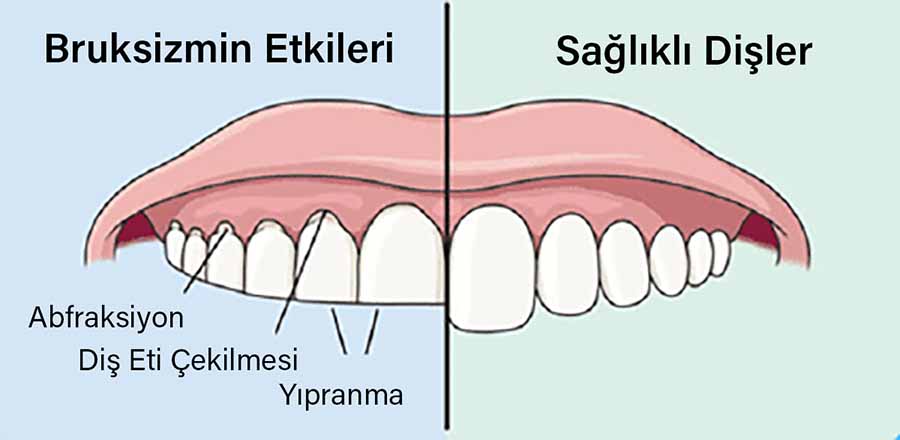
What is Bruxism?
The grinding and clenching of the chewing muscles that occur as a result of activity carried out all day or only at night is scientifically defined as Bruxism. This disorder is known among the people as teeth grinding.
Bruxism is the scientific definition of the grinding and clenching of the chewing muscles, which occurs when the chewing muscles are engaged in activity all day or just at night. This condition is commonly known as teeth clenching. Bruxism is a psychologically based habit. The patient attempts to release the negative energy created by tension within themselves by clenching or grinding their teeth. Bruxism is a harmful habit. Bruxism causes pain and tissue deformity in the jaw joint, jaw, head, neck muscles, teeth, ears, head, and shoulders.
To minimize the damage to the jaw joint caused by this condition, protective appliances called night splints are made, and patients are required to wear them at night. While this method provides sufficient treatment for some people, it is ineffective for others. Night splints attempt to prevent damage to the jaw joint, head, neck muscles, and ear, thereby relieving the patient of pain. Over time, the deformity in the jaw joint increases, leading to jaw locking, popping sounds, an inability to open the mouth, or a dislocated jaw. Bruxism can be more common in large cities like Denizli due to stress.
Bruxism is often addressed through psychological treatment. Today, regular yoga and meditation are considered supportive measures for bruxism, reducing internal tension. Various methods can be used to treat bruxism. Bruxism is no longer a problem.
Factors Causing Disorder
Bruxism has six different causes. These are:
1. Morphological Factors
Anatomical disorders in the maxillofacial region, improperly aligned teeth, and improper interventions that do not align with the teeth in the opposite jaw can cause bruxism.
2. Psychosocial Factors
Anxiety disorders, stress or tension, suppressed anger or frustration, and aggressive or hyperactive personality types can all contribute to bruxism.
3. Neurological Factors
Brain trauma and some neurological disorders can cause bruxism. 4. Neurological Factors
It can occur due to tension during sleep or during light sleep. Bruxism is more common in individuals with sleep apnea syndrome and as a result of sleep disturbances.
5. Central Nervous System Disorders
Bruxism occurs as a complication of Huntington's or Parkinson's disease.
6. Central Nervous System Disorders
Intestinal parasites, nutritional deficiencies, allergies, and endocrine disorders are among the causes of bruxism.
Bruxism most commonly arises from psychosocial factors in Denizli and the surrounding area. In major cities like Istanbul, bruxism often occurs due to this factor.
How is Bruxism Treated?
Bruxism treatment should be performed by physicians who specialize in temporomandibular joint disorders and headaches and neck pain. Studies examining teeth clenching and grinding separately indicate that this is done without grinding. This rate has been reported to be higher in women than in men. It is suggested that the prevalence rate in people with temporomandibular joint disorders is between 26% and 66%.
Related Blogs
-
 What is a Prosthetic Tooth? How is it Attached?
What is a Prosthetic Tooth? How is it Attached? -
What is Restorative Dentistry?
-
Clear Braces
-
 Transparent Plaque Treatment
Transparent Plaque Treatment -
What to Do in Case of Severe Toothache Problems
-
Recommendations for Those Who Use Dentures
-
 Radio Orthodontics
Radio Orthodontics -
 What is Leaf Porcelain?
What is Leaf Porcelain? -
Cleft Lip
-
Symptoms of Wisdom Tooth Pain
-
 What is a Prosthetic Tooth? How is it Attached?
What is a Prosthetic Tooth? How is it Attached? -
 5 Great Tips for a Trouble-Free First Day of Orthodontic Treatment
5 Great Tips for a Trouble-Free First Day of Orthodontic Treatment -
 How to Put on Braces?
How to Put on Braces? -
 Do Braces Affect Speech?
Do Braces Affect Speech? -
Why Are Teeth Crooked (Twisted)?
-
 Who Are Corrective Orthodontic Treatments Applied To?
Who Are Corrective Orthodontic Treatments Applied To? -
 Gapped Teeth (Diastema) Treatment
Gapped Teeth (Diastema) Treatment -
 Do I Need to Use Retainers or Wires After Braces?
Do I Need to Use Retainers or Wires After Braces? -
 What Braces Colors Are Available? Which One Is Best For You?
What Braces Colors Are Available? Which One Is Best For You? -
 How to Floss With Braces?
How to Floss With Braces? -
Do Braces Cause Cavities?
-
What Should You Do If Your Bracket Gets Sinked or Broken?
-
Crooked Teeth Treatment
-
Palate Treatment
-
Fear of the Dentist in Children
-
 In welchem Alter sollte eine kieferorthopädische Behandlung bei Kindern beginnen?
In welchem Alter sollte eine kieferorthopädische Behandlung bei Kindern beginnen? -
What is Clear Correct Clear Aligner Treatment?
-
 Jaw Anomalies
Jaw Anomalies -
Extraoral Appliances in Orthodontics
-
 What is the difference between Invisalign Transparent Plate Treatment and others?
What is the difference between Invisalign Transparent Plate Treatment and others? -
 Antalya Lara Dental Clinic
Antalya Lara Dental Clinic -
 Antalya Muratpaşa Dental Clinics
Antalya Muratpaşa Dental Clinics -
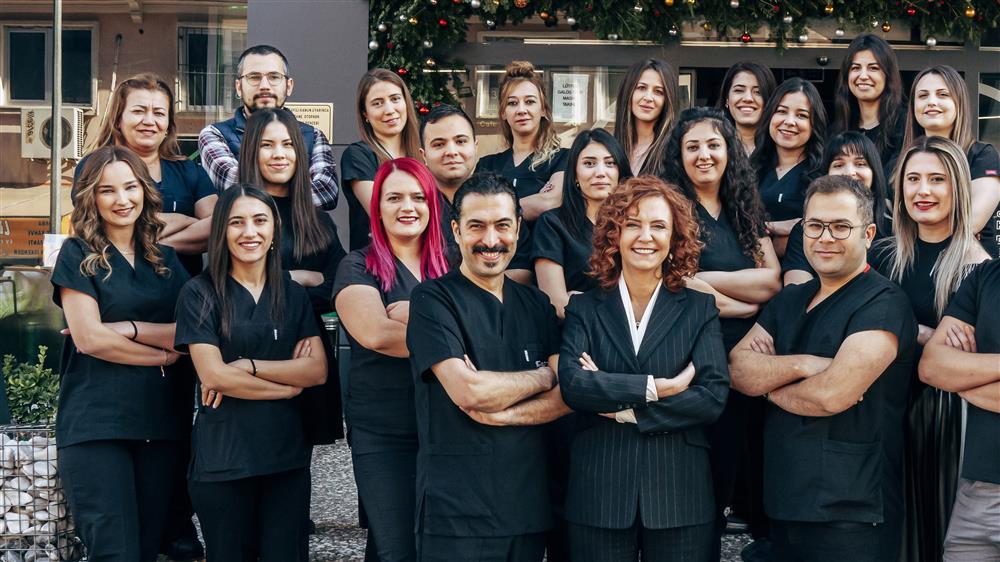 Antalya Dentist
Antalya Dentist -
 What is a Tooth Abscess? How to Treat It?
What is a Tooth Abscess? How to Treat It? -
 What is Cracked Tooth Syndrome?
What is Cracked Tooth Syndrome? -
Wisdom Teeth Symptoms and Surgery
-
 What is Bruxism?
What is Bruxism? -
 What Causes Dry Mouth?
What Causes Dry Mouth? -
 What is Restorative Dentistry?
What is Restorative Dentistry? -
 Why Does the Tooth with Root Canal Treatment Hurt ?
Why Does the Tooth with Root Canal Treatment Hurt ? -
 What is Fluoride?
What is Fluoride? -
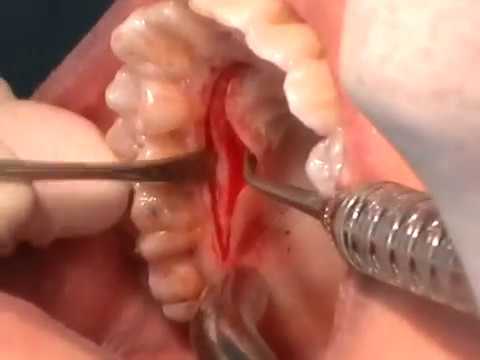 Taking Flesh from the Palate and Making Gums
Taking Flesh from the Palate and Making Gums -
 When Do Milk Teeth Fall Out?
When Do Milk Teeth Fall Out? -
 What type of mirror is a dentist's mirror?
What type of mirror is a dentist's mirror? -
 How to Treat Swollen Gum?
How to Treat Swollen Gum? -
 What Causes Toothache?
What Causes Toothache? -
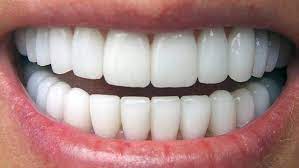 How is Dental Veneer Made?
How is Dental Veneer Made? -
 Teeth Models According to Face Shape
Teeth Models According to Face Shape -
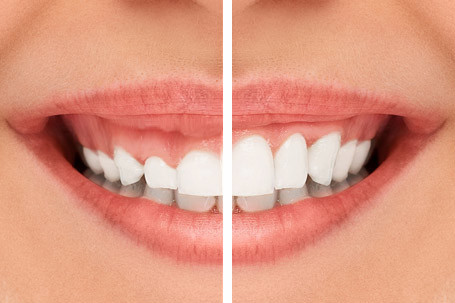 What is Good for Receding Gums?
What is Good for Receding Gums? -
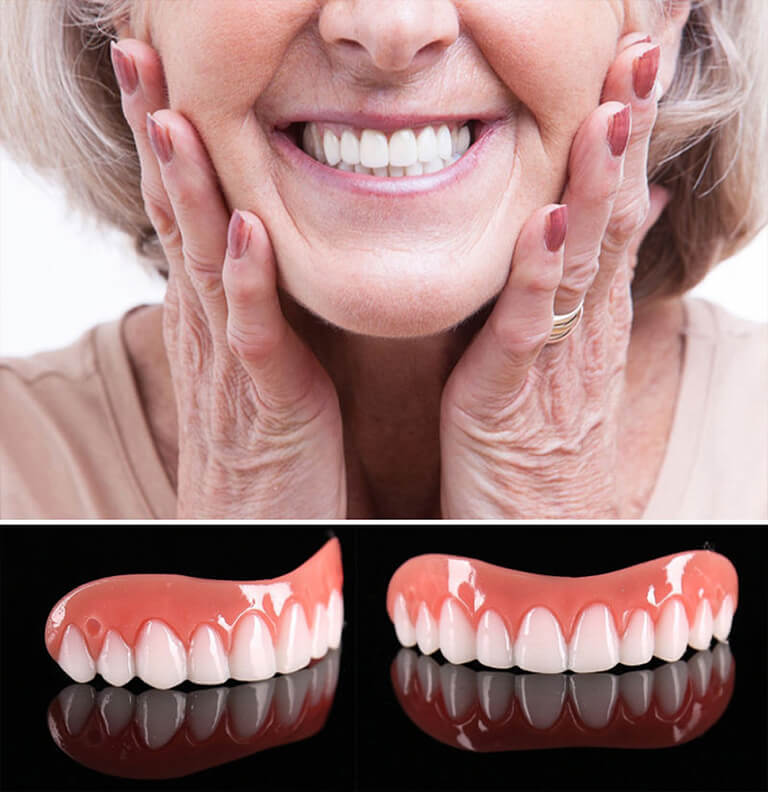 Removable Prosthesis Types
Removable Prosthesis Types -
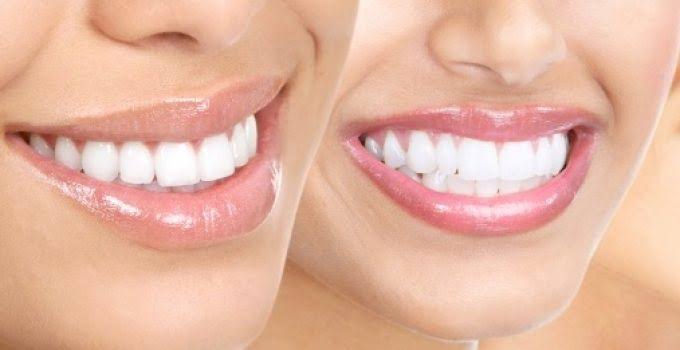 Types of Dental Veneers
Types of Dental Veneers -
 What Happens If the Root of a Broken Tooth Remains?
What Happens If the Root of a Broken Tooth Remains? -
 What Should Be Done to Whiten Yellowing Teeth?
What Should Be Done to Whiten Yellowing Teeth? -
 What is Aesthetic Filling
What is Aesthetic Filling -
 Ağzımı Açarken Çenemden Kemik Sesi Geliyor
Ağzımı Açarken Çenemden Kemik Sesi Geliyor -
 Debridman Nedir?
Debridman Nedir?
Related Blogs
-
 What is a Prosthetic Tooth? How is it Attached?
What is a Prosthetic Tooth? How is it Attached? -
What is Restorative Dentistry?
-
Clear Braces
-
 Transparent Plaque Treatment
Transparent Plaque Treatment -
What to Do in Case of Severe Toothache Problems
-
Recommendations for Those Who Use Dentures
-
 Radio Orthodontics
Radio Orthodontics -
 What is Leaf Porcelain?
What is Leaf Porcelain? -
Cleft Lip
-
Symptoms of Wisdom Tooth Pain
-
 What is a Prosthetic Tooth? How is it Attached?
What is a Prosthetic Tooth? How is it Attached? -
 5 Great Tips for a Trouble-Free First Day of Orthodontic Treatment
5 Great Tips for a Trouble-Free First Day of Orthodontic Treatment -
 How to Put on Braces?
How to Put on Braces? -
 Do Braces Affect Speech?
Do Braces Affect Speech? -
Why Are Teeth Crooked (Twisted)?
-
 Who Are Corrective Orthodontic Treatments Applied To?
Who Are Corrective Orthodontic Treatments Applied To? -
 Gapped Teeth (Diastema) Treatment
Gapped Teeth (Diastema) Treatment -
 Do I Need to Use Retainers or Wires After Braces?
Do I Need to Use Retainers or Wires After Braces? -
 What Braces Colors Are Available? Which One Is Best For You?
What Braces Colors Are Available? Which One Is Best For You? -
 How to Floss With Braces?
How to Floss With Braces? -
Do Braces Cause Cavities?
-
What Should You Do If Your Bracket Gets Sinked or Broken?
-
Crooked Teeth Treatment
-
Palate Treatment
-
Fear of the Dentist in Children
-
 In welchem Alter sollte eine kieferorthopädische Behandlung bei Kindern beginnen?
In welchem Alter sollte eine kieferorthopädische Behandlung bei Kindern beginnen? -
What is Clear Correct Clear Aligner Treatment?
-
 Jaw Anomalies
Jaw Anomalies -
Extraoral Appliances in Orthodontics
-
 What is the difference between Invisalign Transparent Plate Treatment and others?
What is the difference between Invisalign Transparent Plate Treatment and others? -
 Antalya Lara Dental Clinic
Antalya Lara Dental Clinic -
 Antalya Muratpaşa Dental Clinics
Antalya Muratpaşa Dental Clinics -
 Antalya Dentist
Antalya Dentist -
 What is a Tooth Abscess? How to Treat It?
What is a Tooth Abscess? How to Treat It? -
 What is Cracked Tooth Syndrome?
What is Cracked Tooth Syndrome? -
Wisdom Teeth Symptoms and Surgery
-
 What is Bruxism?
What is Bruxism? -
 What Causes Dry Mouth?
What Causes Dry Mouth? -
 What is Restorative Dentistry?
What is Restorative Dentistry? -
 Why Does the Tooth with Root Canal Treatment Hurt ?
Why Does the Tooth with Root Canal Treatment Hurt ? -
 What is Fluoride?
What is Fluoride? -
 Taking Flesh from the Palate and Making Gums
Taking Flesh from the Palate and Making Gums -
 When Do Milk Teeth Fall Out?
When Do Milk Teeth Fall Out? -
 What type of mirror is a dentist's mirror?
What type of mirror is a dentist's mirror? -
 How to Treat Swollen Gum?
How to Treat Swollen Gum? -
 What Causes Toothache?
What Causes Toothache? -
 How is Dental Veneer Made?
How is Dental Veneer Made? -
 Teeth Models According to Face Shape
Teeth Models According to Face Shape -
 What is Good for Receding Gums?
What is Good for Receding Gums? -
 Removable Prosthesis Types
Removable Prosthesis Types -
 Types of Dental Veneers
Types of Dental Veneers -
 What Happens If the Root of a Broken Tooth Remains?
What Happens If the Root of a Broken Tooth Remains? -
 What Should Be Done to Whiten Yellowing Teeth?
What Should Be Done to Whiten Yellowing Teeth? -
 What is Aesthetic Filling
What is Aesthetic Filling -
 Ağzımı Açarken Çenemden Kemik Sesi Geliyor
Ağzımı Açarken Çenemden Kemik Sesi Geliyor -
 Debridman Nedir?
Debridman Nedir?
Populer Blogs
-
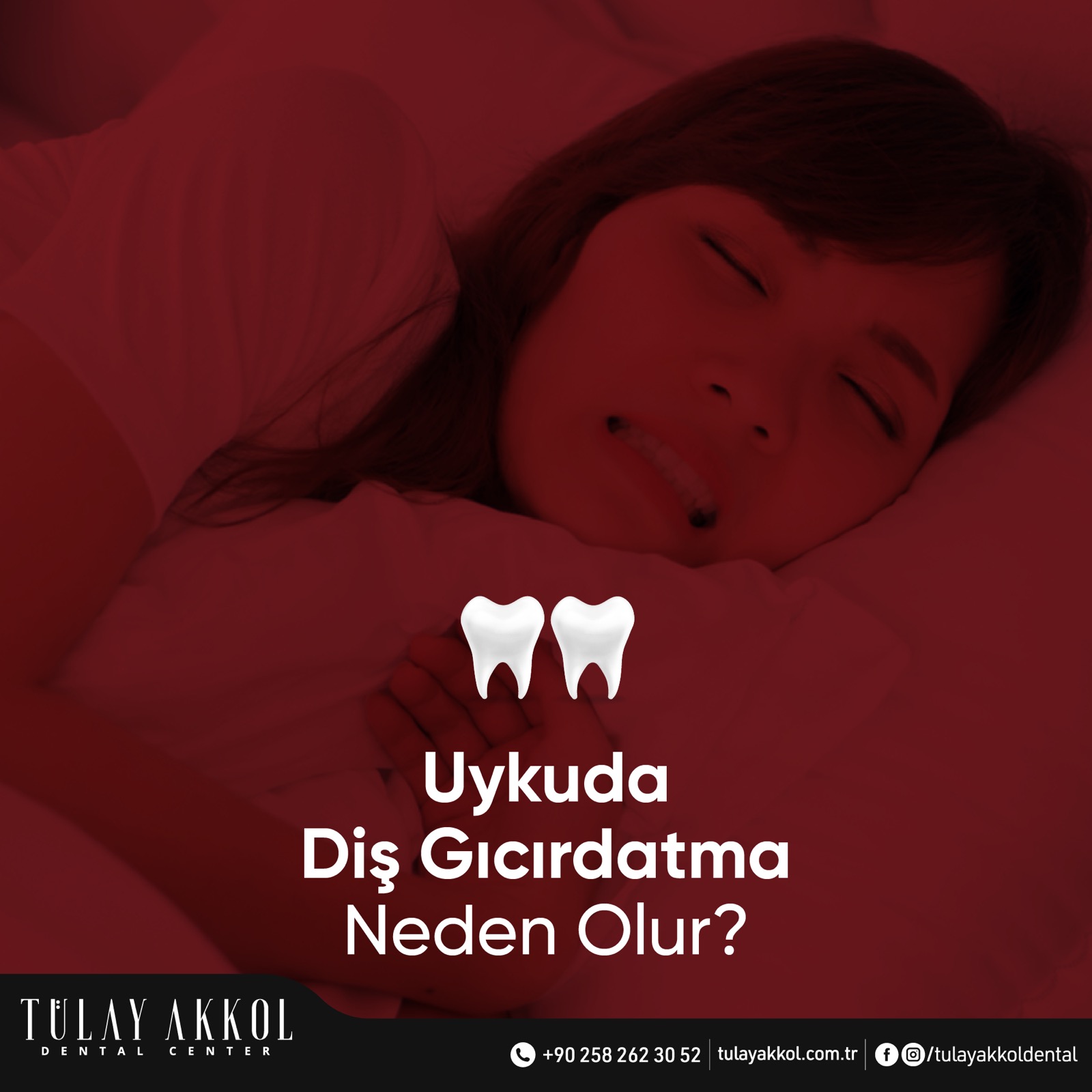 Uykuda Diş Gıcırdatma Neden Olur?
Uykuda Diş Gıcırdatma Neden Olur?





